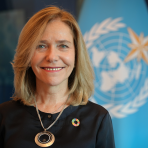Opening Remarks to the WMO Coordination Mechanism (WCM) Side Event
Good afternoon Excellencies, Members, colleagues and friends, thank you for joining us. I am truly delighted to welcome you to this side event on the WMO Coordination Mechanism (WCM).
I would also like to say a special thank you to Switzerland for co-organizing this event and for your engagement. I am grateful to both Switzerland and Denmark for the financial support to the WMO Coordination Mechanism Trust Fund, and to all our many collaborators and partners.
Distinguished guests,
Today we celebrate WMO’s 75th anniversary as a UN agency, with the slogan Science for Action. Over the years, we have saved millions of lives and many billions of dollars.
The need for our services has never been greater and our commitment has never been stronger.
I am therefore proud that the WMO Coordination Mechanism (WCM) is making a real difference on the ground. It is a key component of the Early Warnings for All initiative.
Our goal is clear: to provide timely and actionable weather and climate information to UN and humanitarian agencies for effective preparedness and rapid response.
This is a lifeline for millions of people affected by extreme weather and climate events – many of whom also face social and gender discrimination, conflict, insecurity and displacement.
WCM supports:
- Risk mitigation before disasters unfold
- Situational awareness during crises
- And evidence-based humanitarian response
In short, it helps bridge the gap between science and action in a sustainable way.
Since 2021, the WCM has delivered more than 500 tailored products on tropical cyclones, floods, droughts, heatwaves and other hazards. And this is thanks to WMO Members and centres and collaboration with humanitarian agencies.
The weekly hydromet scan is now a valued part of the humanitarian calendar. It provides a timely and trustworthy snapshot of extreme events which will affect vulnerable communities. Thank you very much to our collaborators DWD, Geosphere Austria, MeteoSwiss and ACMAD.
Recent examples include heavy rain, and the risk of flooding and landslides in South and Southeast Asia, western Africa and parts of South America.
The WCM curates authoritative weather, climate and water information and expert advice from WMO Members and regional centres.
For instance, tropical cyclone forecasts and warnings from the Regional Specialized Meteorological Centre New Delhi support preparedness and anticipatory action in the Indian Ocean and Bay of Bengal. This information is vital for the development of the WCM tropical cyclone and weekly scans.
You will shortly be hearing from Dr Mrutyunjay Mohapatra, Director-General, India Meteorological Department and I extend my warmest thanks to him.
I would also like to welcome Dr Ousmane NDIAYE, Director of the African Centre of Meteorological Applications for Development, ACMAD.
ACMAD actively collaborates on the monthly WCM Global Seasonal Climate Outlook Briefings to UN and humanitarian agencies. These support the growing demand for information on climate impacts of El Niño/La Niña and other seasonal climate drivers to enhance preparedness and strategic planning.
I would like briefly to focus on the example of South Sudan.
Earlier this year, WMO worked with UNHCR, the European Commission’s Joint Research Centre, and many others to develop a HydroMet Outlook for Humanitarian Action in the Upper Nile Basin.
Seasonal forecasts predicted wetter than average conditions in northern East Africa, and so UNHCR asked for hydromet support in South Sudan. Together with partners — including the South Sudan Meteorological Service, Deutscher Wetter Dienst, MeteoSwiss, and GeoSphere Austria — we produced a bi-weekly pilot outlook.
A regional workshop in Nairobi then brought everyone together — including ICPAC and the Water at the Heart of Climate Action project — to refine and expand the product.
Now, the Outlook covers the entire Upper Nile Basin — from Ethiopia and Kenya to Uganda, Rwanda and Sudan and South Sudan.
It is a genuine team effort – as you will hear from Mr Andrew Harper, Special Advisor on Climate Action with UNHCR.
I thank all the National Meteorological and Hydrological Services and WMO regional centres who are providing data, expertise and leadership.
I invite you to join us for the poster sessions and for interaction with WMO Members, Centres, and humanitarian partners who are using the WCM every day.
I hope this event will be a catalyst to build stronger partnerships and forge new alliances.
By working together, we can help the humanitarian community act sooner, respond better and save more lives.
Thank you!
Statement by


